T-Mobile
T-Mobile is the brand name used by some of the mobile communications subsidiaries of the German telecommunications company Deutsche Telekom AG in the Czech Republic (T-Mobile Czech Republic), Poland (T-Mobile Polska), the United States (T-Mobile US) and by the former subsidiary in the Netherlands (T-Mobile Netherlands).
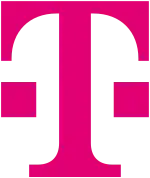 | |
| Product type | Telecommunications |
|---|---|
| Owner | Deutsche Telekom (except Netherlands) |
| Country | Germany |
| Introduced | 1996 |
| Discontinued | |
| Markets | |
| Website | www |
The T-Mobile brand was introduced in 1996 and the name was previously used by subsidiaries in other countries, including Austria (now Magenta), Croatia (now Hrvatski Telekom), Germany (now Deutsche Telekom), Hungary (now Magyar Telekom), Montenegro (now Crnogorski Telekom), North Macedonia (now Makedonski Telekom), Romania (now Telekom România), Slovakia (now Slovak Telekom), and the United Kingdom (now EE Limited).
In 1999, Deutsche Telekom formed the holding company T-Mobile International AG for its mobile communications subsidiaries.[1] From 2003 to 2007, T-Mobile International was one of Deutsche Telekom's services, in addition to "Broadband/Fixnet", "Business Customers" and "Group HQ and Shared Services". In 2009, Deutsche Telekom transformed its structure to adopt a regional setup (Germany, Europe, US). By combining its previously separated fixed and mobile subsidiaries to form integrated local businesses, T-Mobile International itself was merged into Deutsche Telekom AG.[2]
When T-Mobile International AG existed, the holding company was based in Bonn, Germany, and its subsidiaries operated GSM-, UMTS- and LTE-based cellular networks in Europe, the United States, Puerto Rico and the U.S. Virgin Islands. The company had financial stakes in mobile operators in both Central and Eastern Europe. Globally, T-Mobile International's subsidiaries had a combined total of approximately 230 million subscribers. It was the world's thirteenth-largest mobile-phone service provider by subscribers, and the fourth-largest multinational after the UK's Vodafone, India's Airtel, and Spain's Telefónica.[3]
History
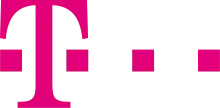
Germany's first mobile-communications services were radiotelephone systems that were owned and operated by the state postal monopoly, Deutsche Bundespost. It launched the analog first-generation C-Netz ("C Network", marketed as C-Tel), Germany's first true mobile phone network in 1985.[4]
On 1 July 1989, West Germany reorganized Deutsche Bundespost[5] and consolidated telecommunications into a new unit, Deutsche Bundespost Telekom.[6][7] On 1 July 1992, it began to operate Germany's first GSM network, along with the C-Netz, as its DeTeMobil subsidiary. The GSM 900 MHz frequency band was referred to as the "D-Netz", and Telekom named its service D1; the private consortium awarded the second license (now Vodafone Germany) chose the name D2.[8] Deutsche Bundespost Telekom was renamed Deutsche Telekom AG on 1 January 1995 as part of phase two of the German communications reform.[6] This process of deregulation continued in November 1996, when DT was privatized and had the largest European IPO at the time, with the stock abbreviation 'DT 1'.[6][8][9]
In December 1999, T-Mobile International AG & Co. KG holding company was founded (later renamed T-Mobile International AG). In 2002, as DT consolidated its international operations, it anglicized the T-Mobil name to T-Mobile.
On 5 July 2005 Deutsche Telekom transformed its structure and adopted a regional setup (Germany, Europe, US). Where available, the local mobile businesses were combined with the respective local wireline businesses to follow the integrated business approach. In 2009 T-Mobile International AG was merged into Deutsche Telekom AG.
On 16 August 2021, T-Mobile announced that a hacker had illegally accessed more than 76 million Americans’ private data,[10][11] with an American hacker named John Binns later claiming responsibility.[12] Several class action lawsuits have been filed in relation to the data breach.[13][14] In July 2022, T-mobile agreed to a $350 million settlement during the company's hearing at Missouri federal court, in relation to the data breech and subsequent class action litigation. The $350 million settlement will include $25,000 in reimbursement for the losses to organisations, compensation to the victims of the data breech of $25 per hour and to provide two-year subscriptions to identity theft services and $150 million on improving data security.[15]
Operations
| Country | Operator | Number of customers (in millions)[16] |
|---|---|---|
| Austria | Magenta Telekom | 5.067 |
| Bosnia and Herzegovina | HT Eronet (JP Hrvatske telekomunikacije d.d. Mostar) (39.10% shares held by Hrvatski Telekom) | 0.4 |
| Croatia | Hrvatski Telekom (51.71%) | 2.273 |
| Czech Republic | T-Mobile Czech Republic | 6.205 |
| Germany | Telekom Deutschland GmbH | 50.272 |
| Greece | Cosmote (Cosmote Mobile Telecommunications S.A.) 100.00% (shares held by OTE) | 6.935 |
| Hungary | Magyar Telekom Nyrt. (60.49%) | 5.503 |
| Montenegro | Crnogorski Telekom A.D. (76.53% shares held by Hrvatski Telekom) | 0.3 |
| North Macedonia | Makedonski Telekom AD (59.21% shares held by Magyar Telekom) | 1.2 |
| Poland | T-Mobile Polska | 11.290 |
| Romania | Telekom Romania Mobile (99.99% shares held by OTE) | 3.539 |
| Slovakia | Slovak Telekom | 2.479 |
| United States | T-Mobile US | 104.789 |
Austria
Until 2000, Magenta Telekom (known then as T-Mobile) was a shareholder of the former max.mobil. network. In April 2001, it acquired one hundred percent and subsequently introduced the T-Mobile brand in Austria by rebranding max.mobil. in April 2002 as T-Mobile Austria. It later rebranded again to Magenta Telekom on 6 May 2019, after acquiring the Austrian operations of UPC from Liberty Global in December 2017.
In 2005, it acquired former competitor tele.ring from Western Wireless International. It is now used as a discount brand. tele.ring is an Austrian mobile network operator. Since it was bought by Magenta Telekom (then T-Mobile) in 2006, it is no longer a legally independent company. Tele.ring is administratively independent and now acts primarily as a discount-offer, similar to Yesss and BoB of A1. In the past, tele.ring was known for their aggressive price-politics.
Croatia
T-Mobile entered the Croatian market in October 1999 when DT initially acquired a thirty-five percent interest in Hrvatski telekom, including its cell phone service provider Cronet. Two years later, DT signed an agreement with the Croatian government to acquire the additional 16 percent needed for a majority holding. In January 2003, Hrvatski Telekom assembled all of its mobile activities under a single brand HTmobile. Finally, in October 2004, HTmobile became T-Mobile Hrvatska, or T-Mobile Croatia, thus joining the global T-Mobile family also by name. Since January 1, 2010, Hrvatski Telekom and T-Mobile Croatia merged into one company on the Croatian market under the name Hrvatski Telekom (in English: Croatian Telecom); the T-Mobile brand remained active in the mobile-business area and T-Com in the fixed-business area until 2013 when they were replaced by unified brand "Hrvatski Telekom".
Czech Republic
T-Mobile was previously known as Paegas in the Czech Republic. T-Mobile Czech Republic a.s. has been operating in the Czech market since 1996.[17] As of 31 December 2014, 6 million customers were using T-Mobile services.[18]
T-Mobile Czech Republic a.s. operates a public mobile communications network on the GSM standard in the 900 and 1800 MHz bands and is also authorized to operate a UMTS network. On 19 October 2005, T-Mobile was the first operator in the Czech Republic to launch this third-generation technology under the name Internet 4G.[19]
Germany
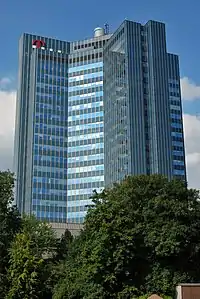
Germany's initial mobile communications services were radiotelephone systems that were owned and operated by the state postal monopoly, Deutsche Bundespost. These early mobile communications networks were referred to as the "A" and "B" networks.
Deutsche Bundespost Telekom built Germany's first cellular mobile network, an analog, first-generation system referred to as the "C" network or C-Netz. The network became operational in 1985 and services were marketed under the C-Tel brand. Following German reunification in 1990, the "C" network was extended to the former East Germany.
On 1 July 1992, Deutsche Bundespost Telekom's DeTeMobil subsidiary began operating Germany's first GSM 900 MHz frequency cellular network, which the organization referred to as D-Netz. Digital GSM services were marketed under the "D1" brand and DeTeMobil continued to sell analog cellular services concurrently under the existing C-Tel brand. In 1994, DeTeMobil introduced short message service (SMS) services.
In 1996, DT began to brand its subsidiaries with the T- prefix, renaming the DeTeMobil subsidiary T-Mobil and rebranding the GSM cellular network T-D1. C-Netz was renamed to T-C-Tel. The T-C-Tel / C-Netz services were fully discontinued in 2000.
D1 introduced prepaid service called Xtra in 1997.[20]
Despite the numerous changes in subsidiary names and brands, Germans sometimes continue to use the T-D1 name within Germany and refer to T-Mobile as D1. On 1 April 2010, after the T-Home and T-Mobile German operations merged to form Telekom Deutschland GmbH, a wholly owned DT subsidiary; the T-Mobile brand was discontinued in Germany and replaced with the Telekom brand.[21]
Hungary
On 1 May 2004, the same day as Hungary joined the European Union, the former company, named Westel (which was owned entirely by the former Matáv) changed its name, and the entire marketing. Westel was the most popular cellphone network in Hungary at the time. The company was called T-Mobile Hungary, but after some financial decisions, as with the other T- companies, it formed to Magyar Telekom Nyrt. Mobil Szolgáltatások Üzletág (Hungarian Telekom, Mobile Services Business Unit), and its branding started to use Telekom instead of T-Mobile. T-Mobile also provides high-speed services, like EDGE, 3G, and HSDPA in Hungary's major cities.
North Macedonia
In Republic of North Macedonia, T-Mobile was previously known as Mobimak. The company has been operating in the Macedonian market since 1996. On 7 September 2006, Mobimak accepted the international T-Mobile branding. By June 2007, T-Mobile reached one million subscribers, out of which 85 percent were active and using their services. T-Mobile MK covers 98 percent of the population. It has a GSM 900 licence, offers GPRS, MMS and mobile internet services using T-Mobile HotSpots and has implemented the EDGE fast mobile internet specification. T-Mobile Macedonia applied for a UMTS licence on 1 August 2007. From 1 July T-Mobile ceased to exist as a legal entity and was replaced by the Telekom brand. The carrier name is now Telekom.mk. The codes are 070/071/072.
Montenegro
The T-Mobile brand entered the Montenegrin market in 2006 through the acquisition of MoNet GSM mobile provider. T-Mobile Montenegro (T-Mobile Crna Gora) is fully owned by T-Crnogorski Telekom, which is itself owned by Magyar Telekom, a DT subsidiary. Although the acquisition by Magyar Telekom was done in 2005, it was not until 26 September 2006, that the MoNet GSM operator was re-branded as T-Mobile Montenegro.
MoNet GSM launched on July 1, 2000, as part of Telecom Montenegro. It became an independent incorporated limited-liability company a month later, on 1 August 2000. The company currently holds around 34 percent of the Montenegrin market and uses GSM 900, GPRS, and EDGE technologies. Since 21 June 2007, 3G/UMTS services have been available in larger cities as well as on the coast.
Netherlands
Deutsche Telekom entered the Dutch market by the acquisition of Ben on 20 September 2002. In 2007, T-Mobile Netherlands, a wholly owned subsidiary of T-Mobile International, acquired Orange Netherlands from France Télécom for EUR 1.33 billion. This makes it the third largest mobile telephone operator in the country behind KPN and Vodafone.
As part of an acquisition of Tele2 Netherlands by T-Mobile Netherlands, which was announced on December 15, 2017, the previous owner Tele2 AB became a 25% shareholder in T-Mobile Netherlands.[22][23]
Poland
T-Mobile Polska serves over thirteen million customers,[24] and owns licenses for 900, 1800, 2100 MHz bands which are used for GSM, WCDMA and LTE.[25] Formerly Era, rebranding took place[26] on 5 June 2011. T-Mobile Poland with Orange Polska have consolidated their infrastructure and used this opportunity to roll out 3G coverage using 900 MHz band.[27]
Slovakia
The T-Mobile brand entered the Slovak market in May 2005, after rebranding the EuroTel network from Eurotel Bratislava to T-Mobile Slovensko nowadays Telekom. The company Eurotel Bratislava was partially owned by Slovak Telekom, an incumbent fixed-line operator, which later acquired a one hundred percent stake in Eurotel Bratislava. T-Mobile International and DT never owned T-Mobile Slovensko directly; DT is partially owner of Slovak Telekom and thus T-Mobile International has procurement managing function within T-Mobile Slovensko. On 1 July 2010, Slovak Telekom and T-Mobile Slovensko merged into one company on the Slovak market under the name Telekom; T-Mobile brand no more remains active in the mobile-business area, as well as the T-Com in the fixed-business area.
The Telekom network provides services on three networks GSM (900/1800 MHz), UMTS (2100 MHz), Flash OFDM (450 MHz). Mobile data services are provided on 4G, 3G, GSM network with EDGE extension and on UMTS with DC-HSPA+ 42 Mbit/s[28] and HSUPA 5,8 Mbit/s. Flash OFDM is one of two commercially successfully launched solely data networks in the world. It supports upload speed up to 5.8 Mbit/s.
United Kingdom

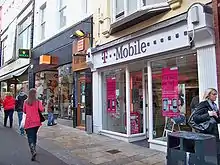
T-Mobile UK started life as Mercury One2One, the world's first GSM 1800 mobile network.[29] It was originally operated by the now-defunct Mercury Communications.[30] Later known simply as one2one, it was purchased by DT in 1999[31] and rebranded as T-Mobile in 2002.[32]
T-Mobile offered both pay-as-you-go and pay-monthly contract phones. T-Mobile launched their 3G UMTS services in the Autumn of 2003. T-Mobile UK's network was also used as the backbone network behind the Virgin Mobile virtual network.
In late 2007, it was confirmed that the merger of the high-speed 3G and HSDPA networks operated by T-Mobile UK and 3 (UK) was to take place starting January 2008. This left T-Mobile and 3 with the largest HSDPA mobile phone network in the country. In 2009, France Télécom's Orange and DT, T-Mobile's parent, announced they were in advanced talks to merge their UK operations to create the UK's largest mobile operator.[33] In March 2010, the European Commission approved this merger on the condition that the combined company sell 25% of the spectrum it owns on the 1800 MHz radio band and amend a network sharing agreement with smaller rival 3.[34] The merger was completed the following month, the new company's name later being announced as EE. Orange and T-Mobile continued as separate brands in the market until 2015,[35] both run by the new parent company.[36]
T-Mobile UK and Orange UK announced on 15 February 2015 the sale of EE Limited to BT Group for £12.5B and to take shares of 12% within the BT Group as part of the deal.
United States
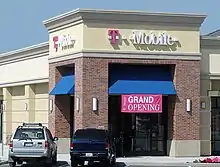
T-Mobile US provides wireless voice, messaging, and data services in the United States mainland including Alaska, Hawaii, Puerto Rico and the U.S. Virgin Islands under the T-Mobile and Metro by T-Mobile brands. The company operates the second largest wireless network in the U.S.[37][38] market with over 95 million customers[39] and annual revenues of $32 billion.[40] Its nationwide network reaches 98 percent of Americans,[41][42] through its EDGE 2G/HSPA 3G/HSPA+ 4G/4G LTE networks, as well as through roaming agreements (see section: Radio frequency spectrum chart). As of 2018, J. D. Power and Associates, a global marketing-information-services firm, ranked the company highest among major wireless carriers for retail-store satisfaction four years consecutively and highest for wireless customer care two years consecutively.[43][44][45][46]
The company owns licences to operate a 1900 MHz GSM PCS digital cellular network and AWS UMTS digital cellular networks using 600 MHz, 700 MHz, 850 MHz, 1700 MHz and 2100 MHz covering areas of the continental U.S., Alaska, Hawaii, Puerto Rico and the U.S. Virgin Islands.[47] It provides coverage in areas where it does not own radio frequency spectrum licenses via roaming agreements with other operators of compatible networks. In addition to its cellular mobile network, T-Mobile US operates a nationwide Wi-Fi Internet-access network under the T-Mobile HotSpots brand. The T-Mobile HotSpot service offers access to a nationwide network of approximately 8,350 access points, installed in venues such as Starbucks coffeehouses, FedEx Office Office and Print Centers, Hyatt hotels and resorts, Red Roof Inns, Sofitel hotels, Novotel hotels, the airline clubs of American Airlines, Delta Air Lines, United Airlines and US Airways, and airports.[48]
T-Mobile US, Inc. traces its roots to the 1994 establishment of VoiceStream Wireless PCS as a subsidiary of Western Wireless Corporation. Spun off from parent Western Wireless on 3 May 1999, VoiceStream Wireless Corporation was purchased by Deutsche Telekom on 31 May 2001, for $35 billion and renamed T-Mobile USA, Inc. in July 2002.[49][50][51] This legacy is reflected in some mismatch between US and German T-Mobile service, notably the frequency mismatch making phones inoperative in the other country, and picture messaging issues (non-delivery of pictures in text messages) between those networks.
After a failed attempt by AT&T in 2011 to purchase the company in a $39 billion stock and cash offer (which was withdrawn after being faced with significant regulatory and legal hurdles, along with heavy resistance from the U.S. government and the Sprint Corporation),[52] T-Mobile USA announced its intent to merge with MetroPCS Communications, Inc., the sixth largest carrier in the U.S., to improve its competitiveness with other national carriers; the deal was approved by the Department of Justice and Federal Communications Commission in March 2013.[53][54][55] The merger agreement gave Deutsche Telekom the option to sell its 72% stake in the merged company, valued at around $14.2 billion, to a third-party before the end of the 18-month lock-up period.[56] On 1 May 2013, the combined company, now known as T-Mobile US, began trading on the New York Stock Exchange as a public company.[57]
Merger with Sprint
On 29 April 2018, T-Mobile and Sprint announced a $26 billion merger deal, with the resulting company to operate under the name T-Mobile.[58] Federal Communications Commission Chairman Ajit Pai announced that he would back the merger. On 11 February 2020, the deal was approved by a federal judge.[59] The merger was completed on 1 April 2020 with Deutsche Telekom holding owning 43% of the company, Softbank at 24% and the remaining 33% to the public shareholders.[60][61]
As part of the merger, T-Mobile US acquired Assurance Wireless, the service subsidized by the federal Lifeline Assistance program, a government benefit program supported by the federal Universal Service Fund.
Marketing

The five-note T-Mobile audio logo was composed by Lance Massey[62] in 1999, and was originally part of the song ("Hello Hola" by Clan Chi) used to promote DT's Tour de France bicycle team.
Sponsorships
T-Mobile, specifically the T-Mobile US subsidiary in the United States, holds the naming rights to T-Mobile Arena on the Las Vegas Strip near Las Vegas, to T-Mobile Center in Kansas City and to T-Mobile Park in Seattle.[63]
T-Mobile's parent company, Deutsche Telekom, has served as the kit sponsor for German Bundesliga club Bayern Munich since 2002. T-Mobile was also the official sponsor of English Football League Championship side West Bromwich Albion and previously sponsored Rotherham United as well as Scottish Premier League clubs Rangers and Celtic.
T-Mobile co-sponsored Everton with the One2One brand and they also sponsored the 2002 FA Youth Cup Final. T-Mobile was also a kit sponsor for English club Birmingham City. The phone company is also involved in sponsoring leagues such as the Austrian Football Bundesliga, which is named the T-Mobile Bundesliga. It was also the official global mobile phone carrier for the 2006 FIFA World Cup football tournament in Germany and sponsored its own cycling team, the T-Mobile Team (later Team HTC-High Road).
T-Mobile also has banner ads at some matches of Mexico's top association football league, Liga MX, despite not having a presence in that country.[64]
Since 2016, the wireless company has sponsored the Major League Baseball Home Run Derby.[65]
See also
- Electronic Beats
- Microsoft data loss 2009
- Open Handset Alliance
- T-Mobile Ekstraklasa
- T-Mobile Team
- T-Online
References
- "Annual Report 2006 PDF" (PDF). Deutsche Telekom AG. p. 76. Retrieved 2017-01-24.
- "Deutsche Telekom – The 2009 financial year. Toward the new Deutsche Telekom. – Group organization". www.annualreport-archive.telekom.com. Retrieved 2017-01-24.
- "Deutsche Telekom: Deutsche Telekom Stabilizes Business in the Second Quarter and Confirms Forecast for Full Year 2009". Deutsche Telekom. Archived October 6, 2011, at the Wayback Machine
- Goransson, Paul; Greenlaw, Raymond (2011-04-01). Secure Roaming in 802.11 Networks. Newnes. ISBN 9780080548944.
- "PostUmwG – nichtamtliches Inhaltsverzeichnis". www.gesetze-im-internet.de.
- "Deutsche Telekom: Telecommunication milestones". www.telekom.com.
- "GG – Einzelnorm". www.gesetze-im-internet.de.
- "Privatization and Deregulation". www1.american.edu.
- Waesche, Niko Marcel (2003). Internet Entrepreneurship in Europe: Venture Failure and the Timing of Telecommunications Reform. Edward Elgar Publishing. pp. 162–164. ISBN 978-1-84376-135-8.
- "T-Mobile Data Breach What To Do". The Washington Post.
- "T-Mobile's Response To Data Breach 2021".
- "T-Mobile Hacker Who Stole Data on 50 Million Customers: 'Their Security Is Awful'". Wall Street Journal. 27 August 2021. Retrieved 25 September 2021.
- "T-Mobile Data Breach Class Action Lawsuit 2021". 27 August 2021.
- "T-Mobile data breach 2021: Here's what it means for securing your data".
- Edwards, Jessy (26 July 2022). "T-Mobile reaches $350M settlement over 2021 data breach". topclassactions.com. Top Class Actions. Retrieved 27 July 2022.
- "Q2 Results" (PDF). Deutsche Telekom. 12 August 2021.
- https://www.t-mobile.cz/dcpublic/IFSR_2004_EN.pdf
- "Deutsche Telekom in the Czech Republic".
- "INTERNET 4G – THE FIRST CZECH UMTS". T-Mobile Czech Republic a.s. Archived from the original on 2013-12-03. Retrieved 2013-11-30.
- T-Mobile.de Mobilfunk History Archived December 16, 2008, at the Wayback Machine
- "T-Mobile ist jetzt Telekom" (in German). Telekom Deutschland GmbH. 2010-04-01. Retrieved 2012-06-30.
- "T-Mobile Nederland en Tele2 bundelen de krachten om te zorgen voor meer concurrentie op de Nederlandse telecommunicatiemarkt". Retrieved 6 June 2020.
- Libbenga, Jan. "Tele2 Nederland overgenomen door T-Mobile". EMERCE. Retrieved 5 June 2020.
- "About T-Mobile in Poland". t-mobile.pl. Retrieved 2012-03-24.
- "Ranges of frequencies allocated for mobile network operators". uke.gov.pl. Archived from the original on 2015-03-21. Retrieved 2015-03-15.
- Zielińska, Urszula; Dec, Łukasz (2011-01-17). "Era zmieni markę i kolor, zaoferuje telewizję" (in Polish). Presspublica. Retrieved 2012-03-24.
- "Koniec modernizacji sieci T-Mobile już we wrześniu". t-mobile-trendy.pl. Archived from the original on 2015-03-17. Retrieved 13 March 2015.
- "T-Mobile launches new DC-HSPA+ network in 5 cities Archived 2012-05-10 at the Wayback Machine" (in Slovak) – 2011-10-13
- Powered by DMflex WebGen --- www.dmflex.com (2011-09-21). "History ~ GSM World". Gsmworld.com. Archived from the original on 2011-05-19. Retrieved 2012-03-24.
- "Mercury One-2-One Challenges the U.K. Cellular Competition". Mobile Phone News (via FindArticles). 13 September 1993.
- "One 2 One Sale Agreed". BBC News. 1999-08-06. Retrieved 2010-03-27.
- "One 2 One To Rebrand as T-Mobile". brandrepublic.com.
- The T-Mobile, Orange Merger: How Will It Affect You? | CHOOSE BROADBAND
- "Orange and T-Mobile Cleared for Mobile Merger by EU". BBC News. March 1, 2010. Retrieved March 1, 2010.
- "Deutsche Telekom and France Telecom Announce Completion of UK Merger" (Press release). Newsroom.orange.co.uk. 2010-04-01. Archived from the original on 2012-04-04. Retrieved 2012-03-24.
- "Orange and T-Mobile Unveil Joint Venture Name, Team, Vision and Plans" (Press release). Newsroom.orange.co.uk. 2011-05-10. Archived from the original on 2012-03-18. Retrieved 2012-03-24.
- "T-Mobile Rises to 3rd Place, Beats Sprint in Carrier Ranking". eweek.com.
- "Sprint announces Q1 2015 earnings – It's still ahead of T-Mobile, but only just". TmoNews. May 5, 2015. Retrieved May 5, 2015.
- "T-Mobile Delivers Unparalleled Financial Results – Tops Revenue and Adjusted EBITDA Estimates". Archived from the original on 2018-09-25. Retrieved 2016-05-09.
- "Archived copy" (PDF). investor.t-mobile.com. Archived from the original (PDF) on 19 February 2015. Retrieved 15 January 2022.
{{cite web}}: CS1 maint: archived copy as title (link) - "4G LTE Network w/ Fast Data | Test Drive Our 4G LTE Network | T-Mobile". T-Mobile. Archived from the original on 24 May 2016. Retrieved 22 October 2015.
- International Prepaid Phone Plans Archived May 11, 2015, at the Wayback Machine
- "J.D. Power Awards T-Mobile For Best Customer Service". DSL Reports. Retrieved 19 May 2013.
- "T-Mobile USA receives J.D. Power award". Wireless Industry News. Archived from the original on 2013-08-18. Retrieved 19 May 2013.
- "T-Mobile Ranks Highest in J.D. Power Customer Care Survey". BrightHand.com. Retrieved 19 May 2013.
- "T-Mobile wins J.D. Power award for customer satisfaction, again". PhoneDog. 12 August 2010. Retrieved 19 May 2013.
- "T-Mobile network bands & technologies". T-Mobile. Retrieved 4 Oct 2018.
- "T-Mobile HotSpot Location" Archived 2013-03-12 at the Wayback Machine. t-mobile.com.
- "VoiceStream Will Now Be Called T-Mobile". Seattle Post-Intelligencer. 2002-07-18. Archived from the original on 2012-10-17. Retrieved 2011-04-27.
T-Mobile, formerly VoiceStream, made its debut yesterday with television, radio and newspaper advertisements in California and Nevada. Over the next few months, the VoiceStream brand will be completely phased out in other cities in favor of T-Mobile.
- Race, Shayndi; Das, Anupreeta (2011-03-21). "AT&T To Buy Rival in $39 Billion Deal". The Wall Street Journal. Archived from the original on 2011-05-09. Retrieved 2011-04-28.
AT&T Inc. said it was buying T-Mobile USA from Deutsche Telekom AG for $39 billion in cash and stock, a move that would create the nation's largest wireless carrier...
- Heberlein, Greg (1999-05-04). "Profit-Taking Pulls Dow Under 11,000". The Seattle Times. Archived from the original on 2011-11-07. Retrieved 2011-04-28.
The Western Wireless-VoiceStream Cellular split, effective yesterday...
- Lee, Timothy B. (2011-12-19). "AT&T admits defeat on T-Mobile takeover, will pay $4 billion breakup fee". Ars Technica. Retrieved 2013-07-09.
- "T-Mobile USA, MetroPCS to combine". Chicago Tribune. Retrieved 3 October 2012.
- Lloyd, Craig (6 March 2013). "T-Mobile, MetroPCS merger gets approval from Department of Justice". Slashgear. Retrieved 13 March 2013.
- Volpe, Joseph. "FCC approves T-Mobile – MetroPCS deal, deems the merger will 'serve the public interest'". Engadget. Retrieved 13 March 2013.
- Rahn, Cornelius (16 May 2013). "Deutsche Telekom Can Sell T-Mobile Before Share Lock-Up Ends". Bloomberg.com. Bloomberg. Retrieved 19 May 2013.
- Rodriguez, Salvador (2013-05-01). "Combined T-Mobile-MetroPCS debuts on N.Y. Stock Exchange as 'TMUS'". Los Angeles Times. Retrieved 2013-07-09.
- "T-Mobile to buy Sprint in $26bn merger". BBC News. 2018-04-29. Retrieved 2018-04-30.
- Kendall, Brent; FitzGerald, Drew (2019-05-21). "T-Mobile, Sprint Get Merger Backing From FCC Chairman". Wall Street Journal. ISSN 0099-9660. Retrieved 2019-05-21.
- "T-Mobile, Sprint confirm updated merger agreement". Retrieved 2020-02-21.
- Bellevue; Washington; Overl; Park; February 20, Kansas-; 2020 –. "T-Mobile and Sprint Announce Amendment to Business Combination Agreement". www.t-mobile.com. Retrieved 2020-02-21.
{{cite web}}: CS1 maint: numeric names: authors list (link) - Maxim Magazine, 100th issue, April 2006, p160
- https://www.thenewstribune.com/sports/mlb/seattle-mariners/article223311265.html
- http://www.poderpda.com/component/option,com_fireboard/Itemid,75/id,14739/catid,5/func,fb_pdf
- Alex Wagner , TmoNews. "T-Mobile sponsoring 2016 Home Run Derby, offering VR experience and more to celebrate." July 7, 2016. Retrieved August 22, 2017.
External links
 Media related to T-Mobile at Wikimedia Commons
Media related to T-Mobile at Wikimedia Commons